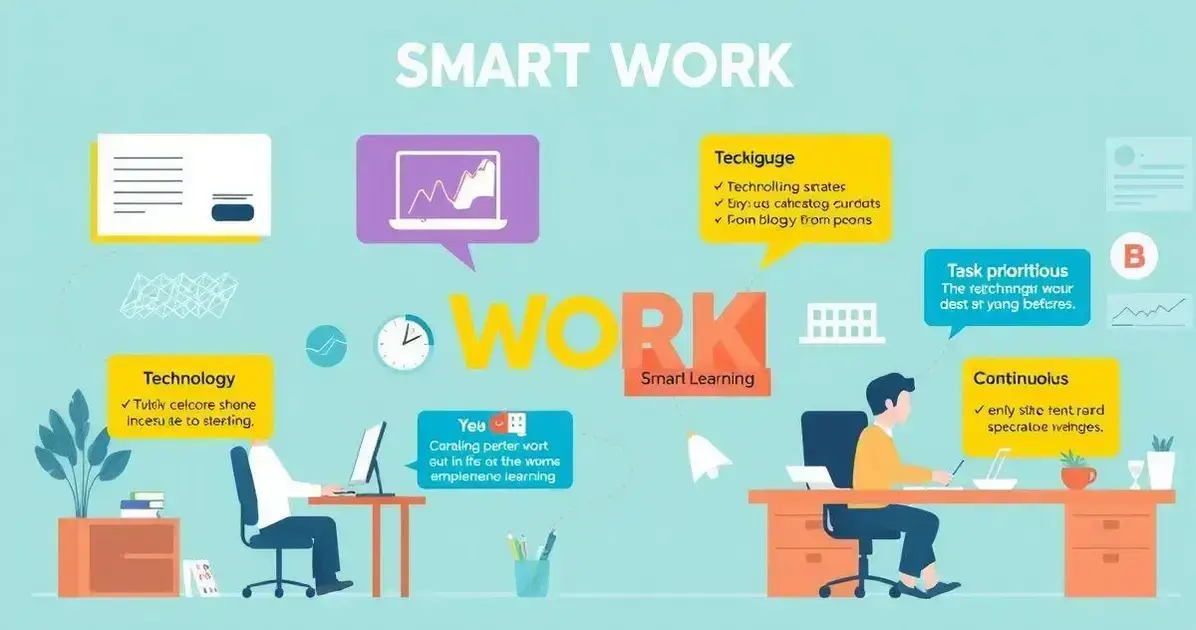Announcements
Strategies smart work enhance productivity by focusing on efficient task management, clear goal setting, and leveraging technology. By avoiding common pitfalls like lack of feedback and overcomplication, teams can achieve greater effectiveness and employee satisfaction.
Strategies smart work are essential for anyone looking to enhance productivity and efficiency. By focusing on effective techniques, you can achieve your goals faster and with less stress.
This article will outline the key aspects of smart work strategies, highlighting the benefits, techniques for implementation, how to measure success, and the common mistakes to avoid.
Announcements
Understanding Strategies Smart Work
Understanding Strategies smart work begins with recognizing the difference between traditional work methods and smart work. Smart work focuses on effectively achieving goals with minimal effort and maximized output. It is not just about working harder; it’s about working smarter. By rethinking your approach, you can enhance productivity and reduce stress.
Defining Smart Work
Smart work is about prioritizing tasks based on their value and impact. Rather than getting lost in a busy schedule, smart workers evaluate which activities contribute most to their success. This process involves planning and organizing tasks effectively to meet goals efficiently.
Announcements
Key Components of Strategies Smart Work
Several components make up effective Strategies smart work:
- Goal Setting: Clear objectives provide direction. Use the SMART criteria: Specific, Measurable, Achievable, Relevant, and Time-bound.
- Time Management: Efficient use of time is crucial. Tools like calendars and task managers can help you allocate your time wisely.
- Collaboration: Working with others can enhance creativity and problem-solving. Engaging with your team leads to better decision-making.
- Continuous Learning: Staying updated with new skills allows you to adapt to changes effectively. Embrace opportunities for training and self-improvement.
- Feedback: Regular feedback helps in assessing performance. Constructive criticism can guide your efforts and enhance results.
Identifying Your Priorities
Understanding what to prioritize is essential for smart work. Use techniques like the Eisenhower Box to distinguish between urgent and important tasks. This helps to identify where your attention is most needed.
Developing a Smart Mindset
To implement Strategies smart work, cultivate a mindset focused on efficiency and effectiveness. Embracing change and being open to new practices can drastically improve how you work. Remember, it’s about being proactive rather than reactive.
Benefits of Smart Work
Benefits of smart work can greatly enhance both individual and team productivity. By focusing on effective strategies, workers can achieve more in less time, reducing stress and improving job satisfaction. Here are some key benefits:
Increased Efficiency
When you implement Strategies smart work, tasks become streamlined. This leads to quicker completion of projects without sacrificing quality. Effective planning and prioritization allow you to focus on what truly matters.
Better Work-Life Balance
Smart work helps individuals avoid burnout by allowing for flexible work schedules. This balance enables workers to fulfill personal responsibilities while maintaining their professional commitments.
Enhanced Creativity
With less stress and better focus, employees can tap into their creative potential. A smart work environment encourages innovative thinking and problem-solving, leading to fresh ideas and solutions.
Improved Collaboration
Strategies smart work often involve collaboration tools that enhance communication among team members. This allows for greater teamwork, sharing of knowledge, and quicker decision-making.
Higher Employee Satisfaction
Finally, when employees feel empowered to work smarter, they often experience higher job satisfaction. Smart strategies lead to a motivated workforce that feels valued and engaged.
Techniques for Implementing Smart Work

Techniques for implementing smart work are essential for boosting productivity and efficiency in the workplace. Here are some practical approaches that can help you transition smoothly to smart work practices:
1. Set Clear Goals
Begin by defining specific, measurable goals. Use the SMART criteria—Specific, Measurable, Achievable, Relevant, Time-bound—to ensure clarity and direction. Goals should be visible to all team members to foster accountability.
2. Utilize Technology
Leverage productivity tools and software to enhance workflows. Platforms like project management apps, communication tools, and time tracking software can help streamline processes and keep everyone on the same page.
3. Prioritize Tasks
Use a priority matrix to categorize tasks by urgency and importance. Focus on completing high-value tasks first to maximize productivity. Consider tools like the Eisenhower Matrix to assist in this process.
4. Foster a Collaborative Environment
Encourage teamwork through regular check-ins and brainstorming sessions. Collaboration enhances creativity and promotes diverse perspectives in problem-solving. Use digital collaboration tools to facilitate communication among remote team members.
5. Embrace Continuous Learning
Invest in training and development for employees. Encourage participation in workshops, online courses, and seminars to keep skills sharp and knowledge current. A focus on continuous learning keeps the team adaptable to new challenges.
Measuring Success in Smart Work
Measuring success in smart work is vital to ensure that the strategies you implement are effective. Here are several key metrics and methods to assess how well your smart work practices are performing:
1. Key Performance Indicators (KPIs)
Establish clear KPIs that align with your goals. These can include productivity rates, project completion times, and quality of work. Regularly review these KPIs to gauge overall performance.
2. Employee Feedback
Gather input from employees regarding their experiences with Strategies smart work. Surveys and one-on-one meetings can provide insights into what is working and where improvements are needed.
3. Time Tracking
Implement time tracking tools to measure how long tasks take to complete. This data can help identify inefficiencies and areas where time can be better allocated.
4. Quality of Work
Evaluate the quality of output by looking at error rates, customer satisfaction scores, and feedback from stakeholders. High-quality results indicate effective smart work practices.
5. Adaptability and Growth
Assess how quickly your team can adapt to changes and take on new challenges. The ability to pivot effectively is a strong indicator of successful smart work implementation.
Common Mistakes in Smart Work
Common mistakes in smart work can hinder productivity and negate the benefits of implementing effective strategies. Here are some key pitfalls to avoid:
1. Lack of Clear Goals
Without well-defined goals, it’s difficult to measure progress and maintain focus. Ensure that your team understands the objectives and the importance of their roles in achieving them.
2. Overcomplication of Processes
Streamlining tasks is the essence of smart work. Avoid creating overly complex procedures that can confuse team members and slow down productivity. Simplicity fosters efficiency.
3. Ignoring Employee Feedback
Failing to seek and act on employee feedback can lead to disengagement and inefficiencies. Regularly check in with your team to gather insights on what is working and what can be improved.
4. Resistance to Change
Being resistant to new ideas and processes can prevent growth. Encourage a culture that embraces change and encourages innovation. Adaptability is crucial for smart work success.
5. Neglecting Work-Life Balance
Smart work aims to improve productivity while maintaining balance. It is important not to overlook employee well-being. Encourage breaks and time off to prevent burnout and keep morale high.
FAQ – Frequently Asked Questions about Strategies Smart Work
What are strategies smart work?
Strategies smart work focus on maximizing productivity and effectiveness by prioritizing tasks, enhancing collaboration, and utilizing technology efficiently.
How can I measure the success of my smart work practices?
Success can be measured through key performance indicators (KPIs), employee feedback, time tracking, quality of work, and adaptability of the team.
What are common mistakes in implementing smart work?
Common mistakes include lack of clear goals, overcomplication of processes, ignoring employee feedback, resistance to change, and neglecting work-life balance.
How do I ensure effective communication in a smart work environment?
Utilize collaboration tools and regularly schedule check-ins to facilitate open communication and ensure everyone is aligned with goals and responsibilities.
Why is feedback important in strategies smart work?
Feedback helps identify inefficiencies and areas for improvement, leading to more engaged employees and better overall performance.
Can smart work boost employee morale?
Yes, by allowing for greater flexibility and focusing on high-impact tasks, smart work can enhance job satisfaction and improve employee morale.







